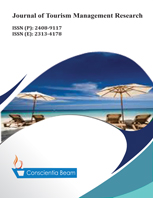The Evolution of Rural Tourism in Developing Countries: The Case of Iran
DOI:
https://doi.org/10.18488/journal.31.2020.72.208.217Abstract
One of the types of modern tourism is rural tourism that has proceeded into a more complicated stage and now it is possible to imply various stages of development in developing countries like Iran. In this case, an evolutionary approach is proposed to carry out multilevel analysis of RT within a region, to the transition from a basic rural economy to a new economic formation, and then the evolutionary economic geography may be a suitable framework. The EEG explains economical transitions as a change from a historically dominant configuration to a new one by the interplay of processes at three various levels, micro (local), meso (regional), and macro (ISDB). The paper is to adjust the EEG approach to the study of RT. We discuss that in Iran the rural transition towards a tourism development was brought up by the sluggishness of the established rural configuration, less capability and subsequently misalignment of economically associated units, shortage of leadership in micro and meso levels are those important problems that have turned into factors disrupting RT development in Iran.

